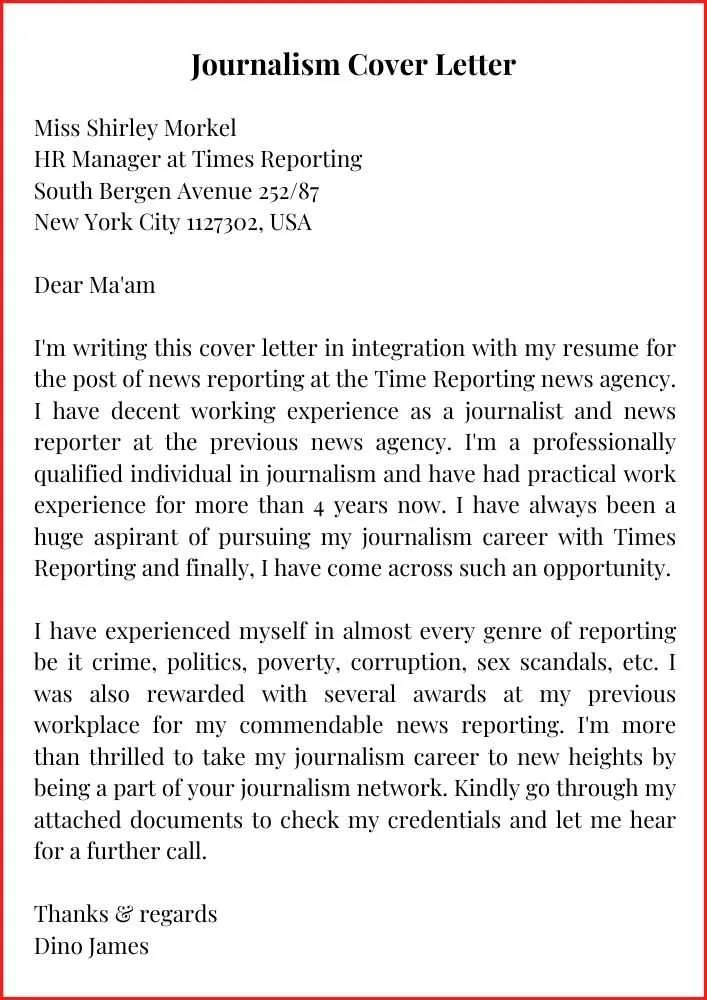What Is a Journalism Cover Letter
A journalism cover letter is a crucial document that accompanies your resume when applying for journalism positions. It’s your opportunity to introduce yourself, highlight your relevant skills and experience, and demonstrate your passion for journalism. Unlike a resume, which is a factual overview of your qualifications, a cover letter allows you to express your personality, writing style, and specific interest in the role and the publication or organization. A well-crafted cover letter can significantly increase your chances of landing an interview by capturing the attention of hiring managers and showcasing why you are the ideal candidate.
Why Is a Journalism Cover Letter Important
In the competitive field of journalism, a compelling cover letter can set you apart from other applicants. It provides context to your resume, allowing you to explain gaps in your experience, elaborate on specific achievements, and express your enthusiasm for the opportunity. It is a chance to showcase your writing skills and ability to communicate effectively, which are essential qualities for any journalist. A strong cover letter shows that you have taken the time to research the publication or organization and tailor your application to their specific needs, demonstrating your genuine interest and initiative. A cover letter can turn the tables and put you on top.
Key Components of a Journalism Cover Letter
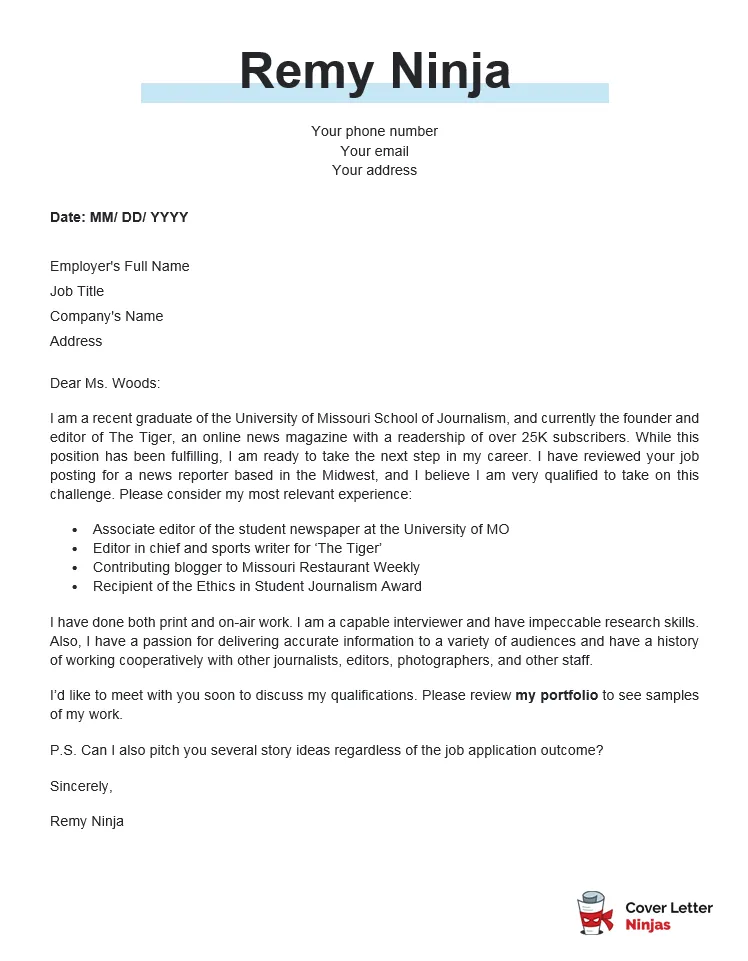
A well-structured journalism cover letter includes several key components. Each part plays a vital role in making a positive impression and conveying your qualifications. Mastering these components helps you create a persuasive and professional application, leading to a greater chance of success in your job search. Make sure you incorporate each component so you can stand out from the competition. The following sections break down the most important parts that you should include to make sure your letter is a success.
Header and Contact Information
Start with a professional header that includes your name, address, phone number, and email address. Ensure your contact information is accurate and up-to-date. If applying via email, consider using a professional email address. This section ensures the hiring manager can easily contact you for an interview. Make sure the information is easy to find and read, so they can see it right away and reach out to you.
Professional Greeting
Address the hiring manager or editor by name if possible. Research the publication or organization to find the appropriate contact person. If you are unable to find a specific name, use a professional salutation such as “Dear Hiring Manager.” Avoid generic greetings like “To Whom It May Concern” as they can make your letter seem less personal and show you haven’t put in the effort to research the company.
Opening Paragraph
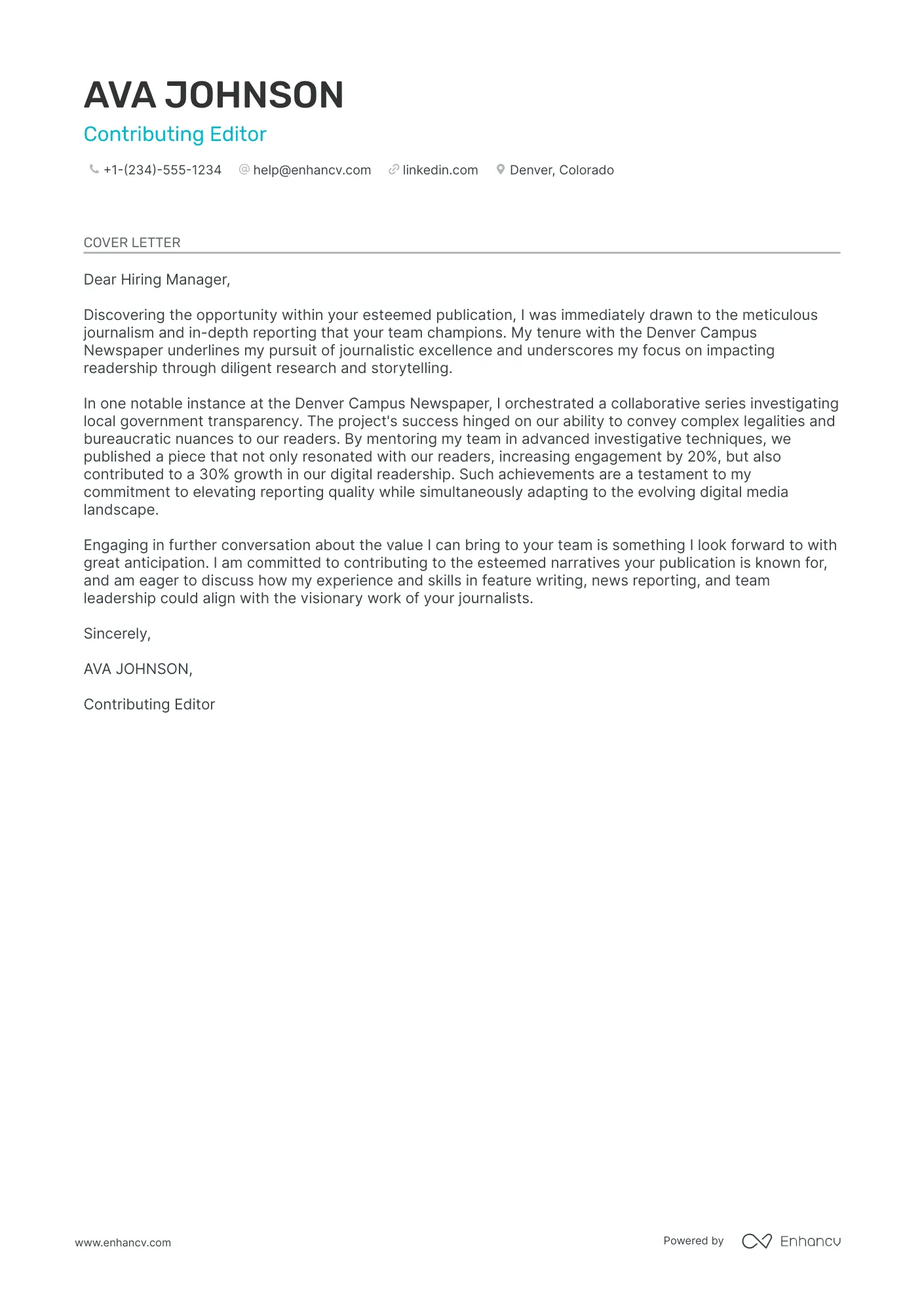
The opening paragraph is your chance to grab the reader’s attention. State the position you are applying for and how you found the opportunity. Briefly mention why you are interested in the role and the publication or organization. Make a strong first impression by expressing your enthusiasm and mentioning your key qualifications or a significant achievement that aligns with the job requirements. Be as concise and persuasive as possible.
Body Paragraphs Highlighting Skills
The body paragraphs are where you showcase your skills and experience in detail. Use these paragraphs to provide specific examples of your accomplishments and how they align with the job requirements. Focus on the most relevant skills and experiences, tailoring your examples to match the job description. Avoid simply restating your resume; instead, provide context and explain the impact of your work. Use strong action verbs and quantify your achievements whenever possible to demonstrate your value. The body should be made up of 2 to 3 paragraphs.
Showcasing Writing Skills
Journalism is all about writing, so demonstrating your writing skills is essential. Include examples of your published work or writing samples that showcase your ability to write clear, concise, and engaging content. Highlight your ability to adapt your writing style to different audiences and formats, whether it’s news articles, features, or opinion pieces. Show that you have a solid grasp of grammar, punctuation, and style guides, along with the ability to use language effectively to convey information and engage readers.
Highlighting Experience and Achievements
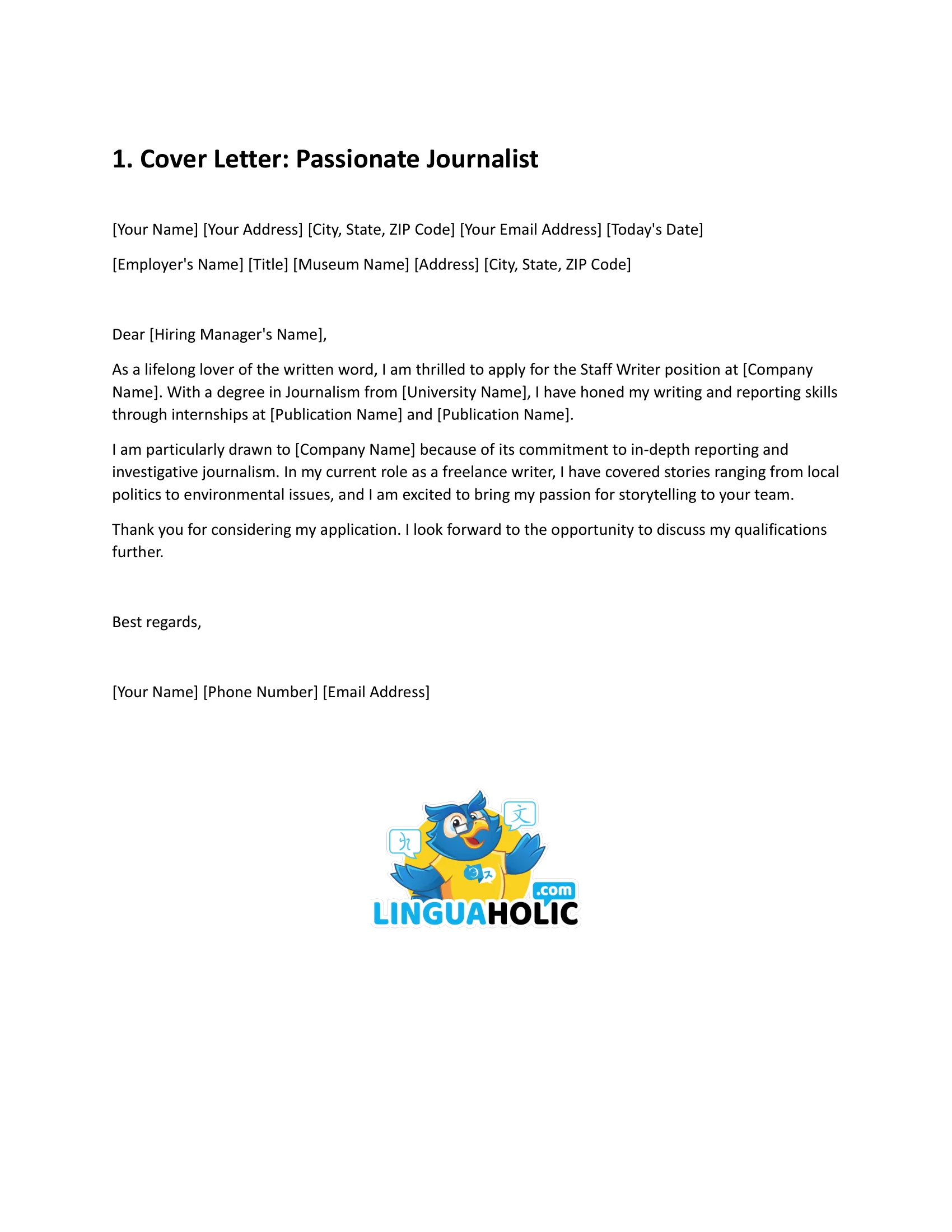
Provide specific examples of your experience and accomplishments. Focus on your most relevant achievements and how they relate to the job requirements. Quantify your achievements whenever possible. For instance, mention the number of articles you’ve written, the audience reach, or the impact of your stories. Use action verbs to describe your responsibilities and accomplishments. Make sure your experiences are clear and easy to understand. Give the hiring manager a better picture of your potential.
Demonstrating Knowledge of the Publication
Show that you understand the publication’s mission, target audience, and content. Mention specific articles, stories, or sections that you admire. Demonstrate that you have researched the publication and have a genuine interest in contributing to their work. This shows your initiative and commitment to the publication, setting you apart from generic applicants. A little extra effort can go a long way when applying to a journalism position.
Closing Paragraph and Call to Action
Reiterate your interest in the position and thank the hiring manager for their time and consideration. Express your availability for an interview and provide your contact information again. End with a professional closing, such as “Sincerely” or “Best regards,” followed by your name. A strong call to action encourages the hiring manager to take the next step, increasing your chances of getting a callback.
Proofreading and Editing
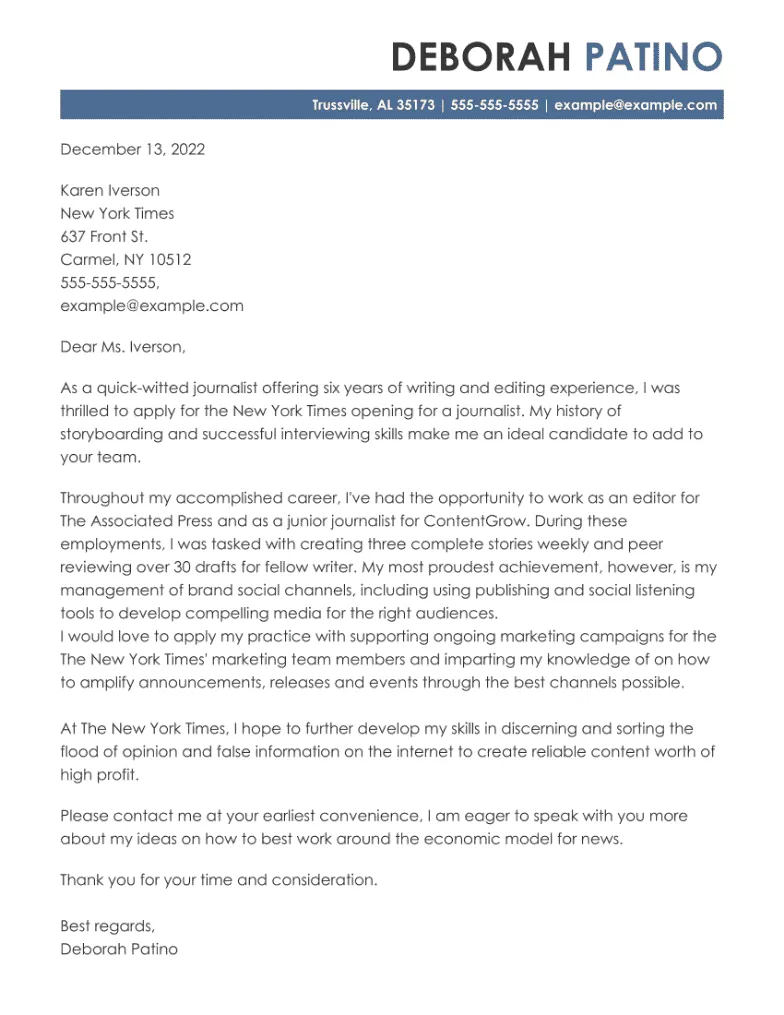
Before submitting your cover letter, proofread it carefully for any grammatical errors, spelling mistakes, or typos. Errors can undermine your credibility and make you appear careless. Ensure that your letter is well-organized, easy to read, and free of any jargon or overly complex language. Consider asking a friend, mentor, or career counselor to review your cover letter for feedback and suggestions. Make sure to give the letter a second look. It’s always important to get a second opinion when applying for journalism jobs.
Cover Letter Journalism Examples
Reviewing examples can help you understand the structure and style of effective journalism cover letters. The following examples provide a framework for different experience levels and specializations.
Example 1 Entry-Level Journalism
This example is suitable for recent graduates or those with limited professional experience. Highlight any internships, volunteer work, or student publications. Focus on your passion for journalism, your writing skills, and your willingness to learn and grow. Emphasize your skills, such as research, interviewing, and storytelling, and how you can contribute to the publication’s mission.
Example 2 Mid-Career Journalist
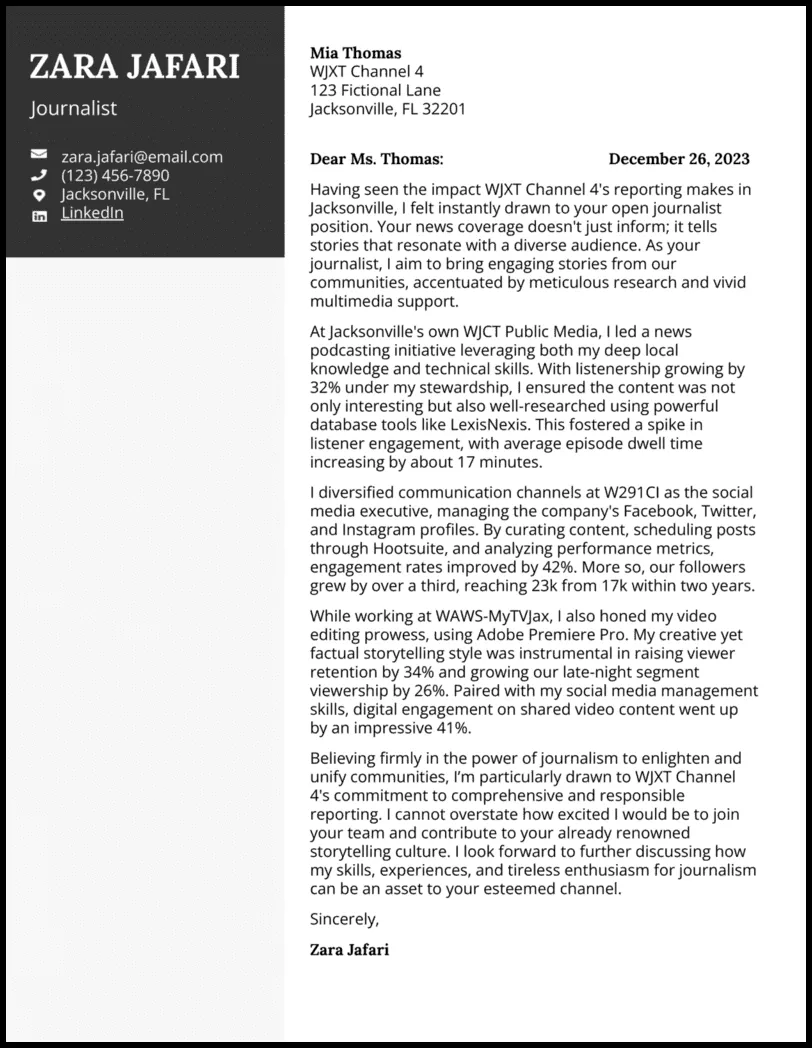
This example is for journalists with several years of professional experience. Showcase your accomplishments, such as awards, published articles, and significant projects. Highlight your expertise in specific areas, such as investigative reporting, political coverage, or feature writing. Demonstrate your leadership skills and ability to mentor others. Focus on your proven track record and how you can make a substantial contribution to the publication.
Example 3 Journalism with Specific Focus
This example is for journalists who specialize in a particular area, such as sports, business, or science. Tailor your cover letter to the specific niche and highlight your expertise and knowledge. Include examples of your work related to that area and demonstrate your passion for the topic. Show how your specialized skills and experience can benefit the publication’s coverage. Emphasize your unique value proposition and why you are the best candidate for the role.
Tips for Customizing Your Cover Letter
Customizing your cover letter to each job application is essential to demonstrate your genuine interest and suitability. Generic cover letters are easily recognized and often discarded. Tailoring your letter shows that you have taken the time to research the role, understand the publication, and consider how your skills and experience align. Use these tips to craft cover letters that stand out.
Tailoring to the Job Description
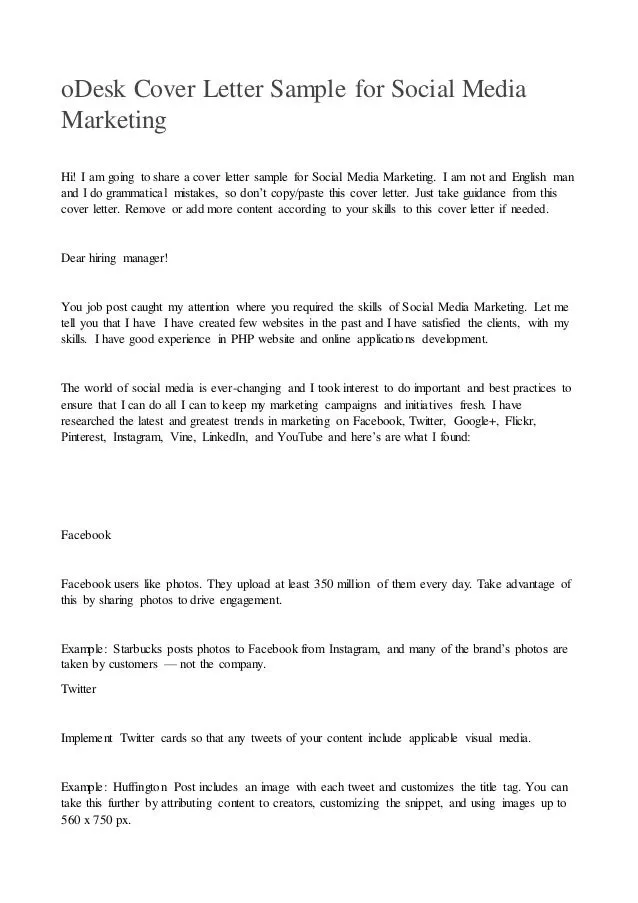
Carefully review the job description and identify the key requirements and qualifications. Customize your cover letter to address these requirements directly. Highlight the skills and experiences that match the job’s needs. Use keywords from the job description throughout your letter to demonstrate your understanding and suitability. The key is to show a clear and compelling match between your qualifications and the employer’s needs. Go through the job descriptions carefully to match your experiences.
Using Keywords Strategically
Incorporate relevant keywords from the job description into your cover letter. Keywords help your application get noticed by applicant tracking systems (ATS) and hiring managers. Use these keywords naturally and strategically throughout your letter, but avoid keyword stuffing. Focus on integrating the keywords into your descriptions of skills, experiences, and accomplishments. Use keywords in a way that makes sense.
Formatting and Presentation
Use a clear and professional format for your cover letter. Choose a readable font, such as Times New Roman or Arial, and use a font size of 11 or 12 points. Maintain consistent spacing and alignment throughout the letter. Ensure that your cover letter is well-organized and easy to read, with clear headings and paragraphs. Use bullet points or lists to highlight your key skills and achievements. Pay attention to the overall presentation, as a clean and professional appearance reflects your attention to detail and professionalism.
